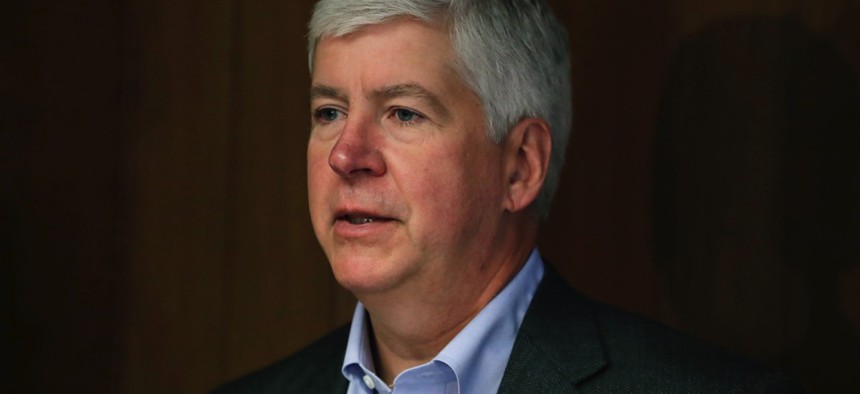Multiple States Court Taiwanese Manufacturer, But Is It Worth the Concessions?

Michigan Gov. Rick Snyder. Carlos Osorio / AP Photo

Connecting state and local government leaders
Foxconn Technology Group is promising $4 billion in investment and 5,000 new jobs, but not every suitor will get a piece of the pie despite cutting taxes, in some cases, to woo them.
Midwestern, Rust Belt states are in the midst of trying to one-up each other as they hope to land a Taiwanese manufacturing company promising thousands of jobs and billions in new investment.
Foxconn Technology Group, which does contract manufacturing for myriad technology companies including Apple, has discussed plans for around $4 billion of new investment and about 5,000 new jobs in the U.S.
As the summer has progressed, as many as seven states—including Michigan, Wisconsin, Pennsylvania and Ohio—have all been floated as possible candidates for that investment, according to a report from The Associated Press.
While many of the state’s governor’s, legislators and economic developers have been been quiet about naming Foxconn specifically—largely citing nondisclosure agreements, according to the AP—there’s been a flurry of activity to create incentives geared toward attracting the company.
Michigan earlier this month passed a controversial package of bills that would grant significant tax breaks to companies creating large numbers of jobs in the state. Other states have also been looking at adding new incentives.
“Michigan has made a tremendous economic comeback in the past six years, and passage of this legislation sends the signal that we are pressing forward to ensure the strongest possible future,” said Michigan Gov. Rick Snyder, a Republican, in a statement at the time the bills were passed. “Where before we were complacent and our economy centered around the Michigan Business Tax and a broken tax code, including an overabundance of tax credits, we are now enacting forward-thinking policies that make us more competitive for new jobs and industries in a fiscally responsible fashion.”
Nonetheless, it’s not clear whether Michigan will even get the investment.
The Wall Street Journal reported Monday that the Taiwan-based company could announce its U.S. investment plans as early as this week and that Wisconsin was near the top of the list.
Other news outlets have reported that Foxconn may spread its investment around multiple states.
A Gulfstream private jet linked to Foxconn has been spotted both in Michigan and in Wisconsin in recent weeks, according to The Detroit News.
But despite the flurry of activity in multiple states all hungry to land a big fish and revitalize and diversify their manufacturing bases, big promises made by Foxconn over the years have yet to come to fruition.
Crain’s Detroit Business reported on the trials and tribulations of Harrisburg, Pa., noting that the southern Pennsylvania city has been the object of the company’s affection for nearly five years.
David Black, president and CEO of Harrisburg’s regional chamber and economic development partner, told Crain’s that multiple stakeholders expressed excitement at the prospect of landing Foxconn investment, but ultimately the Rust Belt city of just under 50,000 people has found new opportunities and moved on from the promise of one large anchor.
That’s a strategy that makes sense to some think tanks tracking economic development policies.
A February 2016 report from Washington D.C.-based Center on Budget and Policy Priorities noted that states are often off-track with their incentives geared toward job creation.
“To create jobs and build strong economies, states should focus on producing more home-grown entrepreneurs and on helping startups and young, fast-growing firms already located in the state to survive and to grow―not on cutting taxes and trying to lure businesses from other states,” the report says.
Nick Manes is a journalist based in Grand Rapids, Mich. and a frequent contributor to Government Executive's Route Fifty. Follow him on Twitter at @nickrmanes.

NEXT STORY: How Job Loss Can Lead to Drug Use




